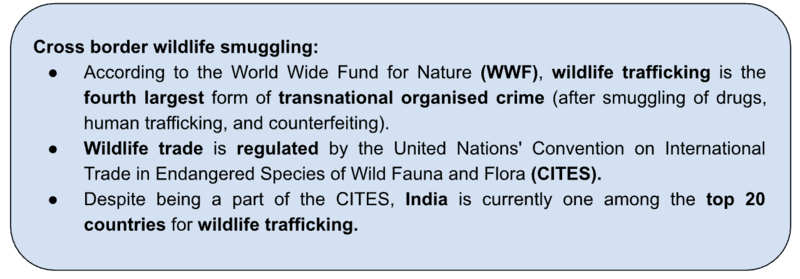News Excerpt:
The Border Security Force (BSF) has thwarted a cross-border wildlife smuggling attempt and rescued 296 Indian star tortoises which were being smuggled to Bangladesh.

About Star Tortoise (Geochelone elegans):
- Indian star tortoises are mostly found in west Pakistan, Sri Lanka, and the central and southern regions of India.
- It usually inhabits dry, arid, open environments including grasslands and scrub woodlands.
- Protection Status:
- Wild Life Protection Act 1972: Schedule IV
- Convention on International Trade in Species (CITES): Appendix I
- IUCN Red List: Vulnerable

Map showing the distribution of Geochelone elegans
According to the study on the Indian Star Tortoise titled ‘Mitochondrial DNA and Distribution Modelling Evidenced the Lost Genetic Diversity and Wild-Residence of Star Tortoise, Geochelone Elegans (Testudines: Testudinidae) in India’ -
- The genetic diversity of Indian star tortoises has been lost as a result of several generations of hybridization between these species.
- Its extremely fragmented habitat is heavily impacted by rising urbanization and agricultural operations.
- Illegal trade and unscientific translocations are causing major losses to the species' genetic diversity and habitat.
- 90% of the trafficking in star tortoises comes from the global pet market, according to the Wildlife Crime Control Bureau.
- Recommendations:
- Genetic screening to identify founder individuals or isolated adult colonies, in the wild or captive for scientific breeding.
- To preserve maximum genetic diversity, avoid inbreeding depression, and support the successful reintroduction of captively bred offspring to the wild to recover the lost heterozygosity of Indian star tortoises.
Prelims PYQ
Q. Consider the following statements in respect of Trade Related Analysis of Fauna and Flora in Commerce (TRAFFIC): (UPSC 2017)
- TRAFFIC is a bureau under United Nations Environment Programme (UNEP).
- The mission of TRAFFIC is to ensure that trade in wild plants and animals is not a threat to the conservation of nature.
Which of the above statements is/are correct?
(a) 1 only
(b) 2 only
(c) Both 1 and 2
(d) Neither 1 nor 2
Q. Consider the following: (UPSC 2013)
- Star tortoise
- Monitor lizard
- Pygmy hog
- Spider monkey
Which of the above are naturally found in India?
(a) 1, 2 and 3 only
(b) 2 and 3 only
(c) 1 and 4 only
(d) 1, 2, 3 and 4


